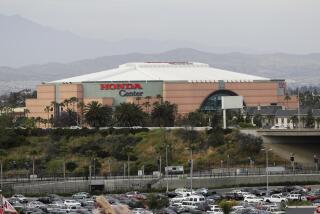U.S.-JAPAN TRADE ACCORD : REACTION IN JAPAN : Progress Could Come Slower Than U.S. Thinks
- Share via
TOKYO — The U.S.-Japan auto accord might be viewed as a major step toward greater foreign access to the Japanese automotive market, but Japanese officials immediately cautioned that progress may not come as fast as portrayed by the Clinton Administration.
Figures on the number of Japanese dealerships that will carry foreign cars, the number of new repair garages in Japan that may be more likely to use foreign parts, and purchases of American parts by Japanese transplant operations in the United States all are estimates made by Washington--not pledges by the Japanese government or Japanese manufacturers, those officials said.
Japanese business leaders expressed concern that the United States might begin to treat those numbers as commitments by Japan, even though they are not contained in the agreement or in the plans announced by manufacturers.
*
“Our announcement today doesn’t directly state how many parts are going to be purchased,” said Taizo Yokoyama, a managing director at Mitsubishi Motors. “Therefore we understand the figures the American side has announced today are calculated upon the estimates they made. I don’t think they will be taken as ones Japanese manufacturers have agreed to.”
Prominent business leader Yotaro Kobayashi, president of Fuji Xerox Co., expressed concern that the figures should “not be viewed as something that the Japanese government has promised.”
“I don’t mean to be impolite to the American government, but this is what Japan has been worrying about the most,” Kobayashi said. “But the agreement clearly says that the Japanese government is not guaranteeing it. I strongly hope this is how things will work out.”
The Clinton Administration, based on the plans announced by Japanese manufacturers, predicted that by 1998, Japanese auto makers will boost their U.S. production to 2.65 million vehicles from 2.1 million, increase U.S. parts purchases by $6.75 billion, raise to 56% the locally procured components in cars made in the United States and raise annual imports of foreign parts for car assembly in Japan to $6 billion.
Washington also predicts that the agreement will boost dealerships in Japan by 200 in the first year and by 1,000 by the year 2000. It predicts that deregulation of the repair garage system will eventually lead to the establishment of 7,000 to 8,000 new garages that will be more likely to use foreign parts.
*
The Japan Automobile Dealers Assn., in a statement released Wednesday evening, noted that the number of Japanese dealers in Japan selling foreign cars has grown from 85 in 1988 to 1,127 today.
The statement said JADA “will encourage Japanese auto manufacturers to pursue a policy of reaffirming to the dealers who handle their cars that those dealers are completely free to handle foreign vehicles.” Such reassurances had been a key U.S. demand in the auto talks.
Individual auto companies also issued “voluntary plans” for expanded overseas operations.




